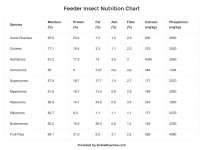JeanTownsend
New member
I'm sure this has been discussed before, but I'm confused as to why crested geckos and others in that family are given the MPD rather than what they eat in the wild. Yet snakes are given real rats (dead, sure, but they don't come from a can). Leopard geckos are given real insects. Bearded dragons are fed real foods. So why are cresties given powdered diets? When you do a quick Google search of "Gargoyle Gecko," it comes up what they eat: "Fruit, nectar, insects, etc." Why do people consider it "bad" to give them their natural foods?
I know several care sheets say to feed them some watermelon (or other fruit, I can't remember) every now and then, but not any more than once a month.
So exactly why is this?
To clarify: I don't have a gecko (or lizard, just a ball python). But I might be interested in a gargoyle gecko, and I'm still doing research. And I know that with any animal that is kept as a pet, their food isn't exactly the same as their wild counterpart. Horses get pellets and things (food's controversial; we give them Fat and Fiber, crushed oats, and a bit of Atlantic Horse Mash), goats are fed things they wouldn't find in the wild, as with cats, dogs, rabbits, etc. The point that confuses me is that these animals are all domestic. Reptiles aren't.
Thanks in advance for any insight you have.
I know several care sheets say to feed them some watermelon (or other fruit, I can't remember) every now and then, but not any more than once a month.
So exactly why is this?
To clarify: I don't have a gecko (or lizard, just a ball python). But I might be interested in a gargoyle gecko, and I'm still doing research. And I know that with any animal that is kept as a pet, their food isn't exactly the same as their wild counterpart. Horses get pellets and things (food's controversial; we give them Fat and Fiber, crushed oats, and a bit of Atlantic Horse Mash), goats are fed things they wouldn't find in the wild, as with cats, dogs, rabbits, etc. The point that confuses me is that these animals are all domestic. Reptiles aren't.
Thanks in advance for any insight you have.
Last edited:


